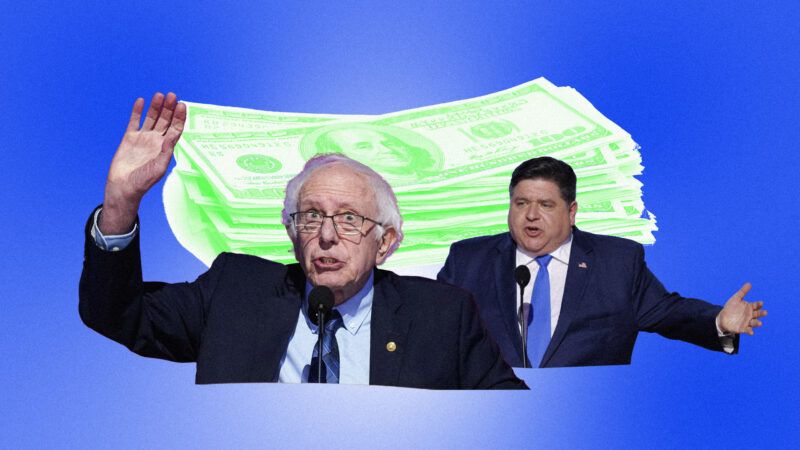How Does the Democratic Party Actually Feel About Billionaires?
Sen. Bernie Sanders calls them "oligarchs," while Gov. J.B. Pritzker gets cheers when touting his own billionaire status.

Tuesday marked the second night of the 2024 Democratic National Convention (DNC), in which speakers included former President Barack Obama, former First Lady Michelle Obama, and Second Gentleman Doug Emhoff. But a pair of speakers earlier in the night demonstrated a long-standing schism in the party.
Sen. Bernie Sanders (I–Vt.) spoke to the crowd earlier in the evening. After waxing poetic about the trillions of inflationary dollars spent during the COVID-19 pandemic, Sanders aired a familiar list of grievances.
"My fellow Americans, when 60 percent of our people live paycheck to paycheck, the top 1 percent have never, ever had it so good," Sanders said. He laid out a list of policies solidly to the left of what President Joe Biden and Vice President Kamala Harris had pursued in office, and "at the very top of that to-do list is the need to get big money out of our political process. Billionaires in both parties should not be able to buy elections, including primary elections."
And yet awkwardly, Sanders was followed by Illinois Gov. J.B. Pritzker—who bragged about his own wealth to ding former President Donald Trump.
"Donald Trump thinks that we should trust him on the economy because he claims to be very rich," Pritzker said. "But take it from an actual billionaire, Trump is rich in only one thing: stupidity!" Forbes estimates Pritzker's wealth at $3.5 billion, while Trump's true net worth has long been a point of contention.
At the invocation of the words actual billionaire, the hall erupted in cheers—an odd juxtaposition with Sanders, who less than 10 minutes earlier had excoriated people exactly like Pritzker as "oligarchs."
The stark contrast raises the question of how, exactly, the Democratic Party and its voters feel about members of the Three Comma Club.
For example, while Sanders castigated billionaires for "buy[ing] elections, including primary elections," Pritzker himself might be the worst offender: Between two runs for governor, Pritzker spent a whopping $323 million of his own fortune. On top of that, in 2022, he gave an additional $24 million to the Democratic Governors Association to run ads in the Republican primary boosting state Sen. Darren Bailey, who was considered a weaker opponent in the general election. (Indeed, Pritzker would defeat Bailey by more than 12 points.)
Pritzker was also among the handful of finalists to be Harris' running mate on the presidential ticket. While he was not ultimately chosen, he had at least two meetings with the campaign and submitted thousands of pages of documents to be vetted.
There are other Democratic and progressive billionaires, as well, some of whom disprove the claim that every election goes to the highest bidder. Businessman and climate activist Tom Steyer spent over $200 million running in the 2020 Democratic primary only to drop out after finishing third in South Carolina. Michael Bloomberg spent more than $1 billion the same year and only won American Samoa.
George Soros, the Hungarian-born billionaire investor seen as a boogeyman by many Republicans, routinely donates hundreds of millions of dollars to Democratic causes in a given campaign cycle, in addition to the billions he has given to promote democracy in former Soviet countries.
In recent years, some Democrats have nonetheless signaled not only a distaste for billionaires but a feeling that their very existence is obscene.
In 2019, newly-elected Rep. Alexandria Ocasio-Cortez (D–N.Y.) told an interviewer that the mere existence of billionaires was a sign of an immoral society. "I don't think that necessarily means that all billionaires are immoral," she clarified, but "a system that allows billionaires to exist…is wrong."
Dan Riffle, an attorney serving as Ocasio-Cortez's policy adviser at the time, changed his Twitter handle to "Every Billionaire Is a Policy Failure." He later elaborated to Vox's Dylan Matthews that society should collectively prevent anyone from amassing that level of wealth: "We can have all 300 and some-odd million Americans vote on it and come up with an average that everybody thinks is a reasonable amount of money. But at some point there has to be an upper bound, right?"
Sanders and Sen. Elizabeth Warren (D–Mass.) have also proposed wealth taxes on fortunes deemed too large.
But that attitude may be in decline in the Democratic Party. Ocasio-Cortez spoke on the first night of the DNC this week and shied away from Sanders' style of billionaire-bashing populism, instead making a more inclusive, positive case for Harris as presidential candidate. Of Ocasio-Cortez's speech, Yair Rosenberg noted at The Atlantic that "the progressive congresswoman is no longer speaking solely to the left wing, but to the party as a whole."
Not everyone to the left of the aisle agrees, of course. "Billionaires are a policy mistake, tax this man into millionaire status before he leaves the stage," progressive journalist Ryan Grim posted on X during Pritzker's speech.
Still, it presents an interesting conundrum for Democrats—whether to bash the very wealthiest as a symptom of an immoral society or to make peace since some of them are on the same team.


Show Comments (61)